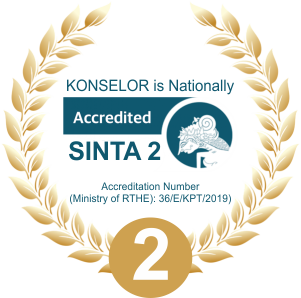A comparison of accountability models in school counseling programs
 ), Shinta Mayasari(2), Sofwan Adiputra(3),
), Shinta Mayasari(2), Sofwan Adiputra(3), (1) Universitas Lampung
(2) Universitas Lampung
(3) Universitas Muhammadiyah Pringsewu
 Corresponding Author
Corresponding Author
Copyright (c) 2021 Mujiyati Mujiyati, Shinta Mayasari, Sofwan Adiputra
DOI : https://doi.org/10.24036/0202093110561-0-00
Full Text:
 Language : en
Language : en
Abstract
The purpose of this study is to analyze the strengths and weaknesses of each accountability evaluation model, in order to make counseling programs easier for counselors to carry out. The method used was qualitative research, which focuses on meanings, definitions, characteristics, symbols and explanations of the concepts learned. The research data was collected through literature reviews and document analysis. In this study, descriptive document analysis methods were also used in data measurement. Descriptive analysis method aims to test the facts and meanings of a research systematically. This model was formed based on different initial goals in the implementation of counseling services. Moreover, Accountability Evaluation Models of School Counseling Program has each of its advantages and disadvantages. The counselor should choose part of the models which is appropriate to the situation and easy to implement in the school, in order for the implementation processes of the institution counseling program to be measured and planned in the future.
Keywords
References
American School Counselor Association (ASCA). (2003). The American School Counselor Association National Model: A framework for school counseling programs. Alexandria, VA: Author.
American School Counselor Association (ASCA). (2005). The ASCA national model: A framework for school counseling programs (2nded.).Alexandria, VA: Author.
Astramovich, R. L., & Coker, J. K. (2007). Program evaluation: The accountability bridge model for counselors. Journal of Counseling& Development, 85(2), 162-172. https://doi.org/10.1002/j.1556-6678.2007.tb00459.x
Badrujaman, A., Furqon, F., Yusuf, S., & Suherman, S. (2015). Pengaruh Model Evaluasi Layanan Dasar Berorientasi Akuntabilitas Terhadap Peningkatan Akuntabilitas Guru BK SMP. PARAMETER: Jurnal Pendidikan Universitas Negeri Jakarta, 27(II), 158-177. https://doi.org/10.21009/parameter.272.08
Berg, B. L. (2001). Qualitative research methods for the social sciences. USA: Allynand Bacon.
Brott, P. (2006). Counselor education accountability: Training the effective professional school counselor. Professional School Counseling, 10(2), 179-188. https://doi.org/10.1177/2156759X0601000204
Bryman, A. (1988). Quantity and quality in social research. London & New York: Routledge.
Buchori, M. (2001). Dari Guidance dan Counseling ke Bimbingan dan Penyuluhan Pendidikan. Jurnal Bimbingan dan Konseling, 4(7).
Dahir, C., & Stone, C. (2003). Accountability: A M.E.A.S.U.R.E of the Impact School Counselors Have on Student Achievement. Professional School Counseling, 6(3), 214-221. Retrieved June 16, 2020, from www.jstor.org/stable/42732431
Dimmitt, Carey. (2010). Evaluation In School Counseling: Current Practices and Future Possibilities. Counseling Outcome Research and Evaluation, 1 (1): 4456. https://doi.org/10.1177/2150137810361306
Eschenauer, R., & Chen-Hayes, S. (2005). The Transformative Individual School Counseling Model: An Accountability Model for Urban School Counselors. Professional School Counseling, 8(3), 244-248. Retrieved June 16, 2020, from www.jstor.org/stable/42732465
Fauziyah, E. (2016). Tingkat Pemahaman Terhadap Konsep dan Praksis Asesmen Pada Guru Bimbingan Dan Konseling Di Sekolah Menengah Pertama Negeri Se-Kabupaten Brebes (Doctoral disertation, Fakultas Ilmu Pendidikan).
Husna, S. (2002). Peranan Layanan informasi terhadap pemahaman diri siswa program percepatan belajar di smu 8. Skripsi. Jurusan BK Fakultas Ilmu Pendidikan Universitas Negeri Jakarta.
Isaacs, M. (2003). Data-Driven Decision Making: The Engine of Accountability. Professional School Counseling, 6(4), 288-295. Retrieved June 16, 2020, from www.jstor.org/stable/42732442
Lankshear, C., & Knobel, M. (2004). A handbook for teacher research. McGraw-Hill Education (UK).
Lindah. (2011). Kepuasan Siswa mengikuti Layanan Dasar di SMA 36 Jakarta. Skripsi. Jurusan BK Fakultas Ilmu Pendidikan Universitas Negeri Jakarta.
Loesch, L. C., & Ritchie, M. H. (2005). The accountable school counselor. Austin, TX: Pro-Ed.
Marvasti, A. B. (2004). Qualitative research in sociology. USA: Sage Publications.
Mason, J. (2002). Qualitative Researching. (2nd ed.). London: Sage Publication.
Merriam, S. B. (2009). Qualitative research: A guide to design and implementation. California: John Wiley & Sons, Inc.
Myrick, R. (2003). Accountability: Counselors Count. Professional School Counseling, 6(3), 174-179. Retrieved June 16, 2020, from www.jstor.org/stable/42732426
Myrick, R. D. (2011). Developmental guidance and counseling: A practical approach. (Fifth Edition). Minneapolis: Educational Media Corporation.
Pancanita, R. I. (2008). Persepsi siswa terhadap layanan BK di SMP 92.Skripsi. Jurusan BK Fakultas Ilmu Pendidikan Universitas Negeri Jakarta.
Rachmalia, N. (2006). Faktor-Faktor Penghambat Pelaksanaan Tugas Pokok Guru Pembimbing. Skripsi. Jurusan BK Fakultas Ilmu Pendidikan Universitas Negeri Jakarta.
Robinson, B. (2002). The CIPP approach to evaluation.COLLIT project, 4.
Sapsford, R., & Jupp, V. (2006). Data collection and analysis. (2nd ed.). London: Sage Publication.
Scarborough, J. (2005). The School Counselor Activity Rating Scale: An Instrument for Gathering Process Data. Professional School Counseling, 8(3), 274-283. Retrieved June 16, 2020, from www.jstor.org/stable/42732469
Stone, C. B., & Dahir, C. A. (2007). School counselor accountability: A measure of student success. Columbus: Pearson Prentice Hall.
Studer, J. R., & Sommers, J. A. (2000). The professional school counselor and accountability. NASSP Bulletin, 84(615), 93-99. https://doi.org/10.1177/019263650008461511
Suastini, N. L. P., Suhandana, G. A., & Yudana, I. M. (2013). Analisis Kesenjangan Kompetensi Profesional Guru BK Berbasis Permendiknas No. 27 Tahun 2008 (Studi pada Para Guru BK SMA Se-Kabupaten Tabanan). Jurnal Administrasi Pendidikan Indonesia, 4(1). https://doi.org/10.23887/japi.v4i1.973
Watkins, R., Meiers, M. W., & Visser, Y. L. (2012). A guide to assessing needs. Washington DC: International Bank for Reconstruction and Development.
 Article Metrics
Article Metrics
 Abstract Views : 1150 times
Abstract Views : 1150 times
 PDF Downloaded : 408 times
PDF Downloaded : 408 times
Refbacks
- There are currently no refbacks.
Copyright (c) 2021 Mujiyati Mujiyati, Shinta Mayasari, Sofwan Adiputra

This work is licensed under a Creative Commons Attribution 4.0 International License.







